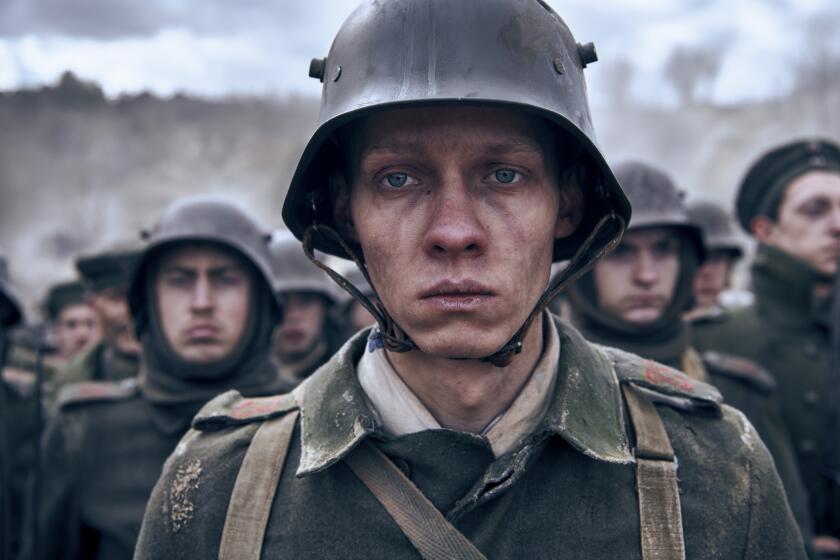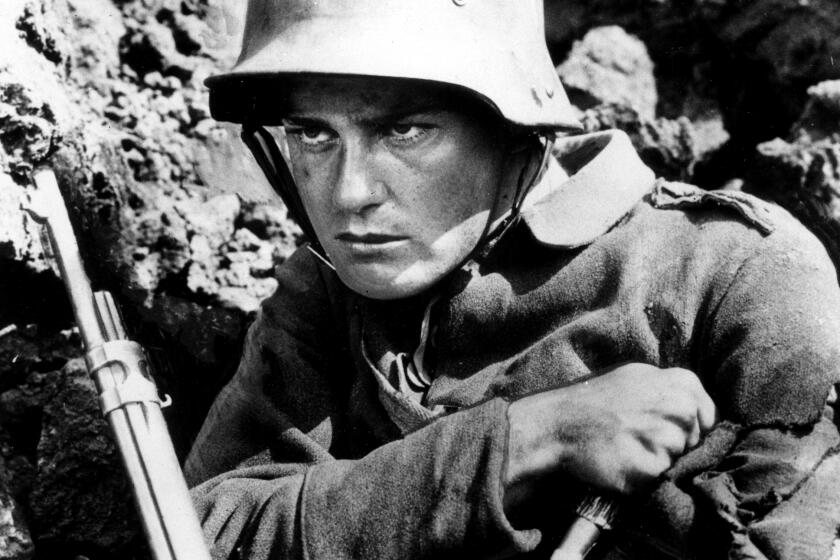An antiwar epic became an awards darling. Why Germans don’t see it quite the same way
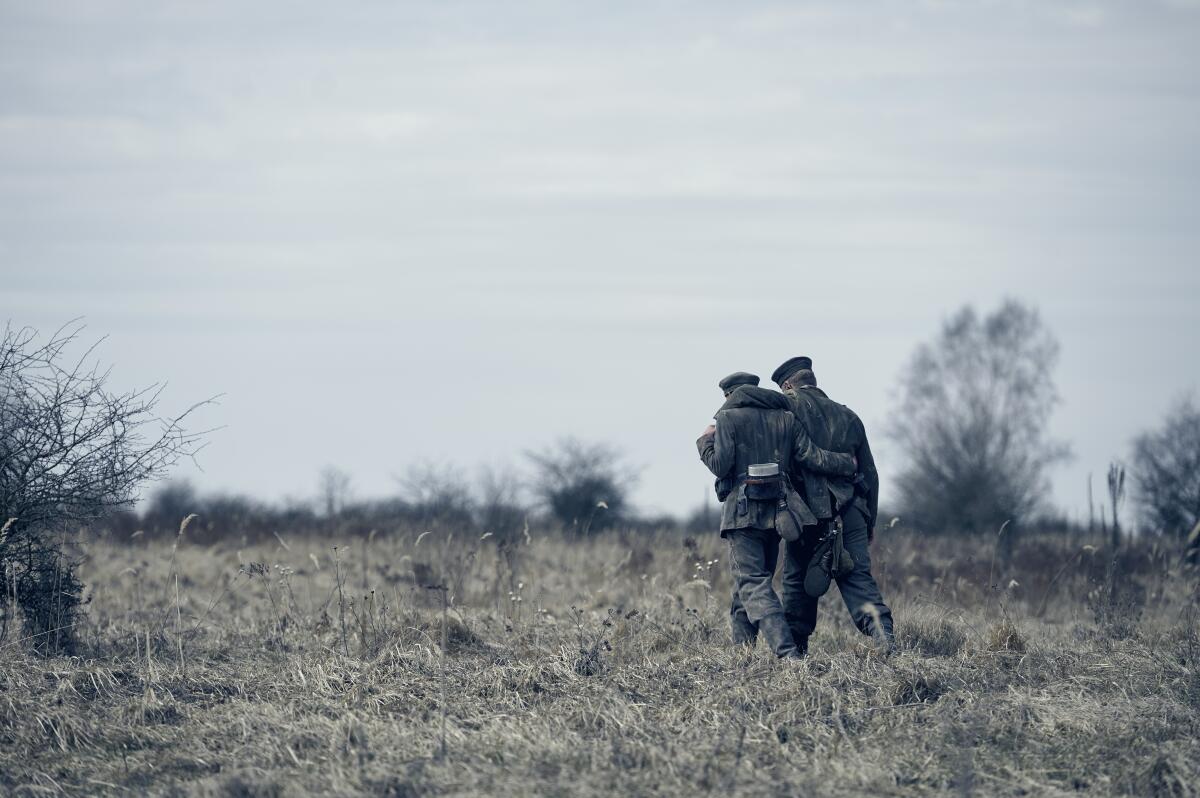
- Share via
The film with this awards season’s most unexpected trajectory may be “All Quiet on the Western Front,” an adaptation of Erich Maria Remarque’s 1929 German-language novel set during World War I. After premiering at the Toronto International Film Festival in September and launching on Netflix in October, the film went on to become the first German-language film nominated for the Oscar for best picture. In all, the film brought in nine Academy Award nominations, making it the third most-nominated non-English-language film in Oscars history, behind only “Crouching Tiger, Hidden Dragon” and “Roma.”
The film also came away as the big winner at Sunday’s BAFTA awards, winning seven, including best film, director and adapted screenplay — more than any other non-English-language film in BAFTA history.
Set from spring of 1917 to the end of the war in November 1918, the film — the first time Remarque’s antiwar classic has been adapted for the screen in its original German — follows teenager Paul Bäumer (Felix Kammerer, in his screen debut) as he enters the army as an enthusiastic recruit and quickly becomes disillusioned by the horrors of the brutal, futile fighting he encounters. Soldiers such as he are expendable pawns to officers safe from the battlefield and who demand the fighting continue even as armistice is only hours away.
Tuesday’s Oscar nominations rewarded fewer contenders from streaming services, a departure from recent years when Netflix dominated.
“We don’t have your history. It’s laden with guilt and shame. We can’t make a movie where a German soldier kills, quote-unquote, an enemy and it’d be a good thing,” explained director Edward Berger. “In an American movie you can kill a bunch of Nazis and it’s a good thing. And in a German movie, you can’t do that.
“You can’t kill the people that came to liberate Europe and feel good about it,” Berger continued. “So I think that people suddenly notice that and go, ‘Wow, I’ve never thought about this.’ And I would feel shameful making a movie like that, because there’s no honor or pride associated with our history. There is something honorable about your ancestors going to Europe and fighting for freedom. You can look back on that. You can honor your veterans. In Germany, you can’t.”
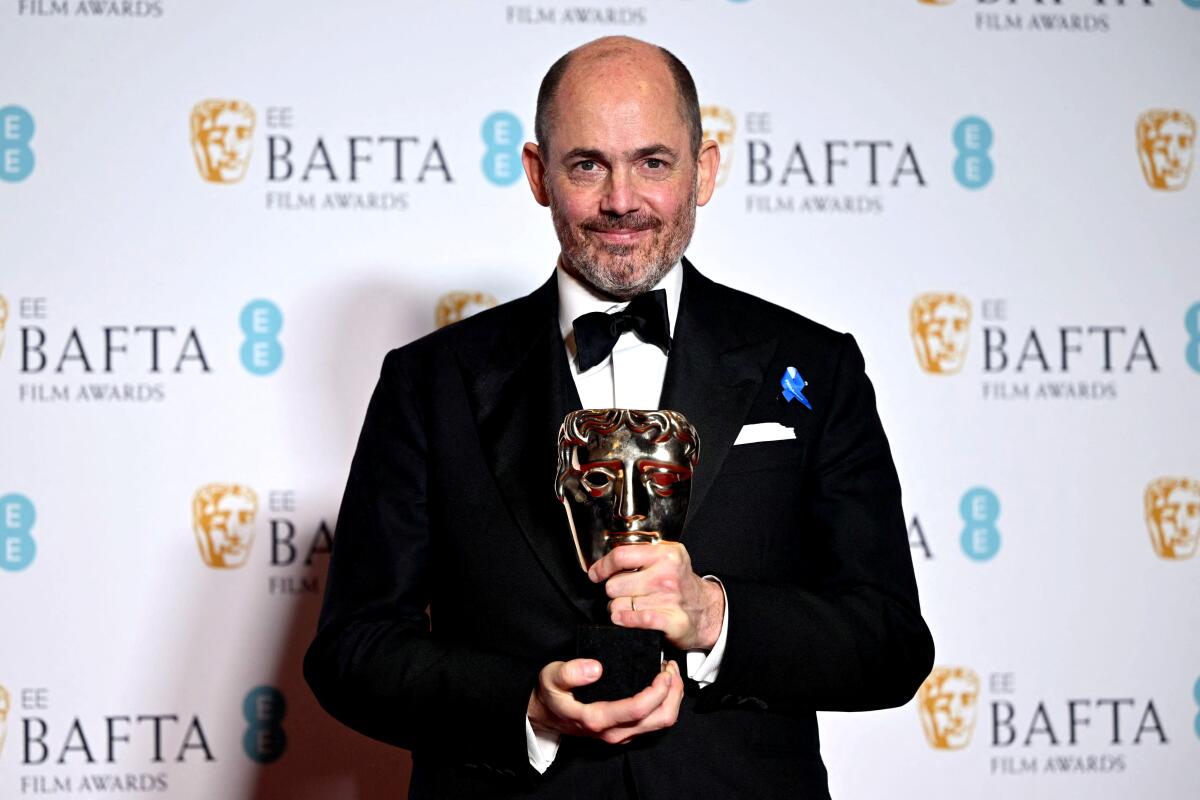
Berger’s film does not shy away from depicting violence, from sweeping large-scale battle scenes to the intimacy of two men fighting to the death in a muddy trench.
“It’s not an enjoyable film. It’s not easy for people to watch,” said producer Malte Grunert. “It’s something that an audience needs to decide to do. So I’m very happy to see that it resonates and there is a connection.”
All of which leads to the question: Why has this film struck such a chord with awards-voting audiences, particularly in the U.S. and the U.K.?
Multiple members of the creative team behind the film point to the ongoing war in Ukraine as one reason the movie could be resonating so strongly in this specific moment.
“You’d hope it would be less relevant over time, but it’s not,” said co-screenwriter Ian Stokell.
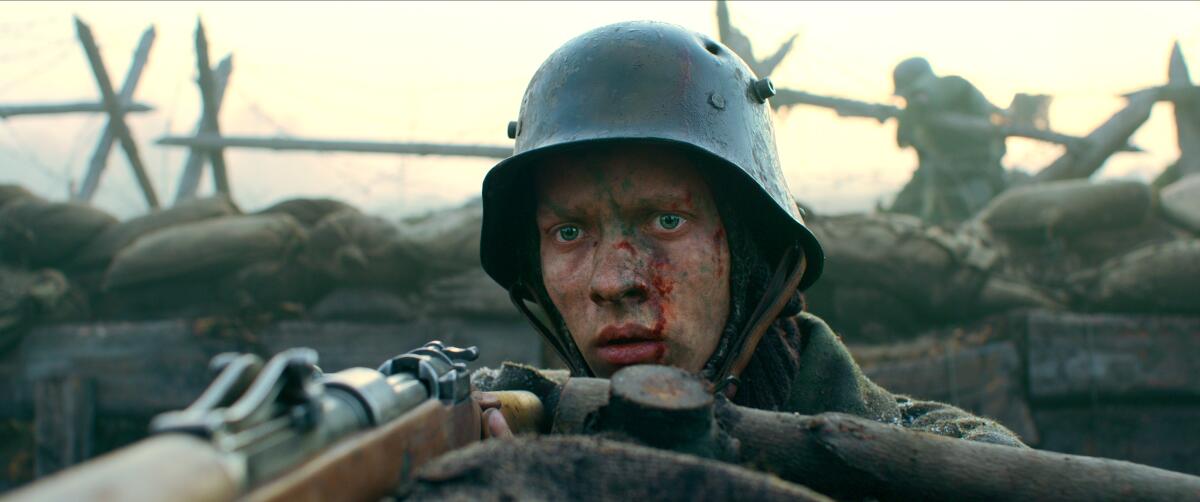
“When you look at the novel through the lens of today, of course we now know what history came after,” said co-screenwriter Lesley Paterson. “So in that regard, that’s something we really wanted to reflect on that is different from the book. But what is very similar to the book is the feeling of absolute loss, absolute betrayal, absolute devastation.
“I think the way that Ed has shot it and the emotional roller coaster that you go on, you feel empty inside, which is exactly what you feel like when you’ve read the book,” said Paterson. “Rather than a literal translation of the book, it’s an emotional translation.”
Paterson and Stokell first optioned the book in 2006. Paterson, a world-champion triathlete, used her race winnings to keep the project afloat over the years and mortgaged her house at one point to hold onto the rights. In writing the script, Stokell drew from his three years in the British Army in the 1970s, including a deployment in Northern Ireland.
Edward Berger’s harrowing new adaptation of Erich Maria Remarque’s classic novel will represent Germany in the Oscar race for international feature.
Though their adaptation was initially in English, once it reached Grunert, the idea was floated to re-adapt the story into German, the original language of Remarque’s novel. (The final script, nominated for an Oscar for adapted screenplay, is credited to Paterson, Stokell and Berger.)
“It pretty quickly felt to me like such an obvious blind spot,” said Grunert. “It is the most successful German-language novel of all time internationally. It is the German novel about World War I and it had never been made in Germany in the German language.”

Berger, perhaps best known to American audiences for his work on the television series “Deutschland 83,” was shooting the Bryan Cranston series “Your Honor” in New Orleans when Grunert called about the “All Quiet” project. Though one obvious influence on the film is Stanley Kubrick’s 1957 “Paths of Glory,” also a WWI-set tale that examines the tension between soldiers in the trenches and officers in a distant chateau, Berger cited his favorite film, Francis Ford Coppola’s “Apocalypse Now,” as a more conscious source of “All Quiet’s” atmospheric storytelling and depiction of wartime as a kaleidoscopic landscape of peril.
In contrast to the film’s abundant success with U.S. and U.K. awards groups, however, it has generated a much more varied reception in Germany. As Philip Oltermann put it in the Guardian summarizing the German-language reviews, the film “has been at the receiving end of a critical drubbing, with critics complaining that it turns a beloved literary classic into a spectacle ‘horny for an Oscar,’ and military historians bemoaning its ‘black-and-white’ historical inaccuracies.”
For his part, Berger disputes just how many of the German reviews have been negative, saying, “It’s not quite true” that the film has been poorly reviewed in Germany.
You can stream the 1930, 1979 and 2022 versions of ‘All Quiet on the Western Front.’ Here’s where to find them, with excerpts from Times coverage.
“Part of the reviews are sort of mixed and they’re definitely also critical reviews, but it’s part of the territory,” said Berger. “You know, you’re going to get critics every time and you can’t please everyone.”
Berlin-based freelance film critic Patrick Heidmann said, “It’s not like the film is generally panned by critics here,” but noted that many of the harshest reviews have come from the nation’s most prominent media outlets.
“So I understand why people would think this film is really not loved in Germany at all,” Heidmann added. “But even the good reviews that I read, they all felt a little bit muted compared to some of the raves that the film has gotten in the U.K. and in the U.S.”
Heidmann also pointed out that “All Quiet on the Western Front” wasn’t nominated for any of the major categories at the European Film Awards, where “Triangle of Sadness,” also an Oscar nominee for best picture, won four top awards. “All Quiet” did receive two EFA prizes, for hair and makeup and special effects.
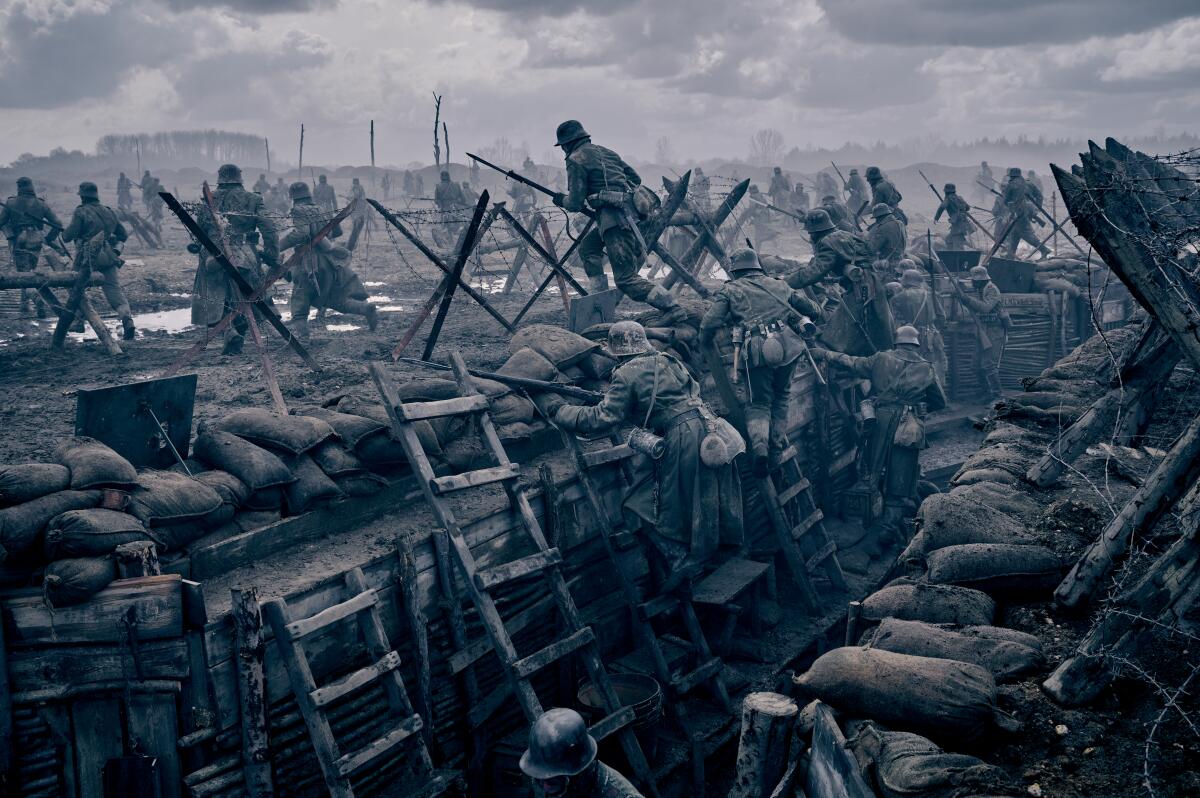
“The German perspective is something very, very different,” said Grunert. “A war film, or an antiwar film, from a German perspective can never be a hero’s journey. The death of an enemy is never a good thing in that context. And I think that’s a perspective that is very, very unique to us as Germans because of our horrible past and our responsibility stemming from that.”
As Berger has traveled around the world with the film, one thing he has noticed is the differing audience response at the end of the film when — spoiler alert — young Paul dies. Audiences tend to gasp at the moment, except in one country.
“Only in Germany people don’t gasp. He dies and people sort of accept it,” Berger said. “First of all, everyone knows the book — that might have something to do with it. But secondly, that expectation that you need someone to survive is not there. It’s almost the expectation that you want everyone to die, because of our history.”
More to Read
Only good movies
Get the Indie Focus newsletter, Mark Olsen's weekly guide to the world of cinema.
You may occasionally receive promotional content from the Los Angeles Times.
